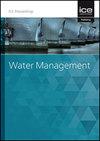一种新的无承压含水层抽水试验数据解释优化框架
IF 1.1
4区 工程技术
Q3 ENGINEERING, CIVIL
Proceedings of the Institution of Civil Engineers-Water Management
Pub Date : 2022-10-24
DOI:10.1680/jwama.21.00115
引用次数: 1
摘要
针对无承压含水层系统开发的复杂井函数公式,使得用经典方法确定含水层参数既困难又低效。此外,含水层参数的维度依赖性以及地下水逆问题的非线性和非凸性使得单独使用元启发式算法在计算时间和精力方面效率低下,产生非唯一解。因此,建立了一个新的优化框架来解释从无承压含水层收集的抽水试验数据。所提出的方法适用于基于两个无维物理参数和新引入的两个非物理参数混合使用的四个输入。本研究充分利用了传统方法的简单性和差分进化算法(DE)的准确性。通过几种泵送测试场景,包括假设的和实际的现场测试数据集,对所介绍方案的能力进行了广泛的检验。还进行了敏感性分析,以了解与估计流量参数相关的不确定性。结果表明,与传统的估计方法和实现的自然启发算法相比,基于DE的估计方案能够获得出色的估计性能。本文章由计算机程序翻译,如有差异,请以英文原文为准。
A Novel Optimisation Framework for the Interpretation of Unconfined Aquifer Pumping Test Data
The complex well function formulations developed for the unconfined aquifer systems make the determination of aquifer parameters difficult and inefficient via the classical methods. In addition, the dimensional dependency of the aquifer parameters as well as non-linear and non-convex fashion of inverse groundwater problems could make the stand-alone use of the metaheuristic algorithms inefficient in terms of computation time and effort, producing non-unique solutions. Therefore, a novel optimisation framework was established to interpret the pumping test data collected from an unconfined aquifer. The proposed approach works with four inputs which are based on the hybrid use of two non-dimensional physical and newly introduced two non-physical parameters. This study grasps the benefits of the simplicity of the traditional methods and the accuracy from Differential Evolution Algorithm (DE). The capability of the introduced scheme was broadly examined by several pumping test scenarios including hypothetical and the real field test datasets. A sensitivity analysis was also performed to understand the uncertainty associated with the estimated flow parameters. The results reveal that the proposed scheme powered by DE is able to achieve the outstanding estimation performance over the conventional methods and the implemented nature-inspired algorithms.
求助全文
通过发布文献求助,成功后即可免费获取论文全文。
去求助
来源期刊
CiteScore
2.10
自引率
0.00%
发文量
28
审稿时长
6-12 weeks
期刊介绍:
Water Management publishes papers on all aspects of water treatment, water supply, river, wetland and catchment management, inland waterways and urban regeneration.
Topics covered: applied fluid dynamics and water (including supply, treatment and sewerage) and river engineering; together with the increasingly important fields of wetland and catchment management, groundwater and contaminated land, waterfront development and urban regeneration. The scope also covers hydroinformatics tools, risk and uncertainty methods, as well as environmental, social and economic issues relating to sustainable development.

 求助内容:
求助内容: 应助结果提醒方式:
应助结果提醒方式:


